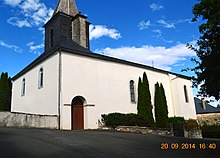Commune in Nouvelle-Aquitaine, France
Ainharp (French pronunciation: [ajɲaʁp] Basque : Ainharbe )[ 3] commune in the Pyrénées-Atlantiques department in the Nouvelle-Aquitaine region in southwestern France .
Geography
The Fronton at Ainharp
Location
Ainharp is located some 50 km west by southwest of Pau, 15 km southeast of Saint-Palais , and 10 km north-west of Mauleon-Licharre . It is part of the former province of Soule .
Access
The commune can be accessed by road D242 from Lohitzun-Oyhercq in the west passing through the village and continuing southeast to Mauleon-Licharre . The D344 road also goes to the north from the village through the commune then east to Espes-Undurein . The commune terrain is undulating of mixed farmland and forest.[ 4]
Hydrography
Located in the drainage basin of the Adour , the commune is the source of numerous streams including the Lagardoye which forms part of the south-eastern border, the Quihilleri which forms much of the western border, and the Lafaure which forms much of the northern border.[ 4]
Localities and hamlets
Agueberria
Agueberriborda
Aisaguerpia
Aranco
Armagnague
Arranchiaga
Barrechia
Bente
Bidartia
Bidegainia
Bolondo
Bordagaya
Bordalecu
Cabanna
Cacoa
Carricaburu[ 5]
Carricabuya
Carricart
Chorho
Elhorria
Elhorriberry
Erreguenia
Estecachoury
Etchebarnia
Etchebestemborda
Etchecopar
Garay
Habiague
Intsauspia
Jaigüberria
Larria
Leiciagueçahar
Lohitzun
Mercapidia
Oyhemburia
Oyhenart
Palasiona
Pekeix
Sallaberria
Urruty
Uthuriet
Neighbouring communes and villages [ 4]
[ 6]
Toponymy
The commune name in Basque is Ainharbe .[ 3] [ 7]
Ainharp Town Square Jean-Baptiste Orpustan proposed two etymological interpretations:
a meaning of "low heather" from ilharr meaning "heather " and -be (from behere meaning "low") or
"height of the low rocks" from gain meaning "high" and har meaning "rock" that indicates the high position of the village on the left bank of the Saison . The following table details the origins of the commune name and other names in the commune.
Name
Spelling
Date
Source
Page
Origin
Description
Ainharp Ayharp
1472
Raymond
4
Notaries
Village
Ainharp
1479
Orpustan
224
L'Espitau d'Anharp
1479
Raymond
4
Ohix
Aynharp
1479
Raymond
4
Ohix
Aignharp
1608
Raymond
4
Insinuations
Ayharp
1690
Orpustan
224
Carricaburu Carricaburue
1479
Raymond
42
Farm
Habiague Habiague
1476
Raymond
74
Ohix
Farm
Lafaure La Phaura
1538
Raymond
135
Reformation
Stream on the northern border
La Phaure
1863
Raymond
135
Lambare lo bedat de Lambarre
1476
Raymond
91
Ohix
Hamlet and Wood
Chemin Mercadieu lo cami Mercadieu
1479
Raymond
112
Ohix
Farm
le cami deu Mercat
1479
Raymond
112
Sources:
Origins:
History
Paul Raymond noted on page 4 of his 1863 dictionary that the commune was a former priory in the diocese of Oloron and that there was a hospital for pilgrims.[ 5]
Administration
List of Successive Mayors of Ainharp [ 13]
Mayors from the French Revolution to 1929
From
To
Name
1794
1807
Bernard Aguerreberry
1807
1820
Armand Oyhenburu
1820
1848
Jean Etchart
1848
1852
Martin Salamendy
1852
1854
Jean Etchart
1854
1855
Alexandre Bente
1855
1858
Pierre Mercabide
1858
1871
Bernard Etchart
1871
1874
Echeberry
1874
1880
Marc Iratchet
1880
1884
Marc Barneche
1884
1885
Joseph Armagnague
1885
1888
Roch Guiresse
1888
1892
Marc Barneche
1892
1908
St. Jean Etchart
1908
1929
Francois Barneche
The Town Hall Mayors from 1929
From
To
Name
1929
1950
Jean Guiresse
1950
1959
François Elissiry
1959
1971
Jean-Pierre Aguer
1971
1983
Jean Lascaray
1983
2026
Jean-Pierre Arhanchiague
Inter-communality
Ainharp is a member of seven intercommunal structures:
the Communauté d'agglomération du Pays Basque
the association to support Basque culture
the intercommunal association of the Valley
the intercommunal association for the construction and operation of the CES of Mauleon
the AEP association for Soule Country
the remediation association for Soule Country
the energy association of the Pyrénées-Atlantiques
Population
The inhabitants of the commune are known as Ainharbars [ 14] Ainharbear .[ 15] [ 7]
Historical population Year 1968 194 — 1975 186 −0.60% 1982 181 −0.39% 1990 161 −1.45% 1999 142 −1.39% 2007 151 +0.77% 2012 143 −1.08% 2017 141 −0.28% Source: INSEE[ 16]
Economy
The activity is mainly agricultural (maize and livestock). The town is part of the Appellation d'origine contrôlée (AOC) zone of Ossau-iraty .
Culture and heritage
Religious Heritage
Ainharp Church Old Hilarri in the churchyard The commune has a church which dates back to the 11th century and a Calvary -Bell Tower from the 17th century. Its cemetery features Hilarri dating from the time of the bell tower.
The village is located on a secondary road of the pilgrimage to Saint Jacques de Compostela [ 17] Saint-Palais to Saint-Michel-le-Vieux which had a hospice for pilgrims called Benta then to L'Hôpital-Saint-Blaise , Osserain, Pagolle , Roquiague , Haux , Larrau , and Ordiarp .
Facilities
The commune has a primary school.
See also
References
^ "Répertoire national des élus: les maires" . data.gouv.fr, Plateforme ouverte des données publiques françaises (in French). 2 December 2020.^ "Populations de référence 2022" (in French). The National Institute of Statistics and Economic Studies . 19 December 2024.^ a b AINHARBE , Auñamendi Eusko Entziklopedia (in Spanish) ^ a b c Google Maps ^ a b c Topographic Dictionary of the Department of Basses-Pyrenees Paul Raymond , Imprimerie nationale, 1863, Digitised from Lyon Public Library 15 June 2011 (in French) ^ Géoportail , IGN (in French) ^ a b Euskaltzaindia - Academy of the Basque language (in Basque) ^ Jean-Baptiste Orpustan, New Basque Toponymy ISBN 2 86781 396 4 (in French)
^ Departmental Archives of Pyrénées-Atlantiques (in French)
^ Manuscripts from the 15th century in the Departmental Archives of Pyrénées-Atlantiques (in French)
^ Manuscripts from the 17th century in the Departmental Archives of Pyrénées-Atlantiques (in French)
^ Manuscript from the 16th to 18th centuries - Departmental Archives of Pyrénées-Atlantiques (in French)
^ List of Mayors of France ^ Pyrénées-Atlantiques , habitants.fr^ Brigitte Jobbé-Duval , Dictionary of place names - Pyrénées-Atlantiques , 2009, Archives and Culture, ISBN 978-2-35077-151-9 (in French) ^ Population en historique depuis 1968 , INSEE^ Philippe Veyrin, The Basques , page 110, Arthaud, 20 December 1975 ISBN 978-2-7003-0038-3 (in French)
External links
Wikimedia Commons has media related to
Ainharp .









